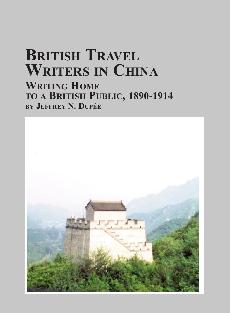This is our backup site. Click here to visit our main site at MellenPress.com
British Travel Writers in China - Writing Home to a British Public, 1890-1914

| Author: | Dupée, Jeffrey N. | |
| Year: | 2004 | |
| Pages: | 364 | |
| ISBN: | 0-7734-6497-2 978-0-7734-6497-1 | |
| Price: | $239.95 | |
The travel writers, or travel savants, as they are characterized in the work, rarely traveled alone but typically promoted a travel persona of the idealized solitary traveler derived from deeply engrained traditions in Western travel literature. Such solitary projections were mitigated by a narrative device that envisioned traveling companions in the form of an imaginary British readership. They sought to bring to their readers parts and elements of China not yet visited or profiled by Western writers. A critical component of the study engages travel encounters, namely the crowds, servants, official, transportations forms, inns, foods, dangers, and hardships of the road. Such encounters invoked fascination and wonder, but also engendered fear, aversion, and irritation – responses central to the norms of travel writing and the travel savant’s identity that invariably colored the representational process, reinforcing existent stereotypes about China and the Chinese
Reviews
“This book investigates exciting terrain – travel literature crafted by British travelers in China in the decades prior to World War I. Engaging with Edward Said’s Orientalism, and employing Benedict Anderson’s notions of solidarity to recover linkages between the producers and consumers of this literary sub-genre, the book elaborates a typology of travelers and travel writers and promotes the categories of travel savant and policy savant to understand the literary encounter with the real and imagined China. This nuanced chronicle of the extremely diverse views of Isabella Bird, Alicia Archibald, Mary Gaunt and numerous others enables readers to ‘see’ which aspects of China attracted and repulsed English language writers, be they the Great Wall, the Chinese justice system, opium smoking, or Chinese hotels.” – Michael A. Osborne, Associate Professor of History and Environmental Studies, University of California, Santa Barbara
“…he lays out in careful detail the role travel literature plays in the post-modern theoretical debate within social science of the meaning of the cultural contact between the West (Britain) and non-European countries (China). Social scientists will find this book a thought-provoking analytical reflection of the complex and multi-faceted road to globalization….this literature, taken as a group, is a rich source of Chinese ‘ethnography’ of the time. Sociologists, reading this book, will be interested in the depictions of social class and inequality, governmental controls on travel, and criminal justice….There are some real social and political lessons to be learned from these encounters.” – Robert W. Gardner, Professor of Social Work, Doctoral Program Director, Loma Linda University
“…he lays out in careful detail the role travel literature plays in the post-modern theoretical debate within social science of the meaning of the cultural contact between the West (Britain) and non-European countries (China). Social scientists will find this book a thought-provoking analytical reflection of the complex and multi-faceted road to globalization….this literature, taken as a group, is a rich source of Chinese ‘ethnography’ of the time. Sociologists, reading this book, will be interested in the depictions of social class and inequality, governmental controls on travel, and criminal justice….There are some real social and political lessons to be learned from these encounters.” – Robert W. Gardner, Professor of Social Work, Doctoral Program Director, Loma Linda University
Table of Contents
Table of Contents:
Preface; Introduction; Theoretical Reflections
1. Envisioned Companions: Writing to an Imaginary British Readership
2. European Settlements in china: Seeking and Evading Expatriate Cocoons
3. Representing Difference: The Chinese through British Travelers’ Eyes
4. Chinese Encounters: Negotiating Difference on the Road through China
5. Creature Comforts: Grumbling about Travel Accommodations
6. Travel Misfortunes: Narratives of Danger, Frustration, and Excursions Gone Wrong
Conclusion; bibliography; Index
Preface; Introduction; Theoretical Reflections
1. Envisioned Companions: Writing to an Imaginary British Readership
2. European Settlements in china: Seeking and Evading Expatriate Cocoons
3. Representing Difference: The Chinese through British Travelers’ Eyes
4. Chinese Encounters: Negotiating Difference on the Road through China
5. Creature Comforts: Grumbling about Travel Accommodations
6. Travel Misfortunes: Narratives of Danger, Frustration, and Excursions Gone Wrong
Conclusion; bibliography; Index
